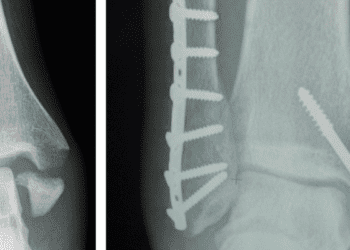Venous thromboemobolism after major cancer surgery not associated with increased mortality
Image: PD
1. A retrospective review of US hospital discharge records from 1999-2009 showed an increase of in-hospital venous thromboemobolism events (VTE) following major cancer surgery but a decrease in VTE-related mortality.
2. The increased frequency of VTE events may be due to improved detection methods without affecting mortality.
Evidence Rating Level: 2 (Good)
Study Rundown: VTE is a important post-surgical complication and a cause significant morbidity and mortality. This study used a population-based assessment to quantify the occurrence of VTE following major cancer surgery from 1999 to 2009. The results showed an increased frequency of in-hospital VTE events during this time period, however, VTE-related mortality decreased during this time period. The increase in VTE frequency was hypothesized to be due to increased adoption of diagnostic tests (e.g. D-dimer assays) resulting in increased detection. Multiple logistic regression of patient characteristics revealed that increased age, female gender, black race, presence of comorbidities, and lack of access to private health insurance were associated with increased risk of VTE. Although the strength of the study is its large sample size, no information was provided on tumour staging/grade, use of VTE prophylaxis, patient BMI, or estrogen use, which may confound risk factors found in this study.
Click to read the study in JAMA Surgery
Relevant Reading: Venous Thromboembolism and Cancer
In-Depth [retrospective cohort study]: This study analyzed hospital discharges records from 2 508 916 patients that underwent major cancer surgery in the US from the Nationwide Inpatient Sample. VTE events following major cancer surgery increased 4.0% (95% CI, 2.9% – 5.1%) annually during this time period. This increase did not result in a corresponding increase in mortality; VTE-associated mortality decreased 2.4% (95% CI, -4.3% to -0.5%) annually in this time period. Patient factors associated with increased risk of VTE included Black race (vs white, OR 1.56; p<.001), Medicaid (vs private, OR 2.04, p<.001), Medicare (OR 1.39, p<.001), uninsured (OR 1.49, p<.001), female (vs male, OR 1.25, p<.001) and >3 comorbidities (OR 1.85, p<.001).
By David Wang and Andrew Bishara
More from this author: HIV-infected infant potentially cured with antiretroviral therapy, High prevalence of head impact observed in senior falls
© 2013 2minutemedicine.com. All rights reserved. No works may be reproduced without expressed written consent from 2minutemedicine.com. Disclaimer: We present factual information directly from peer reviewed medical journals. No post should be construed as medical advice and is not intended as such by the authors, editors, staff or by 2minutemedicine.com. PLEASE SEE A HEALTHCARE PROVIDER IN YOUR AREA IF YOU SEEK MEDICAL ADVICE OF ANY SORT.








